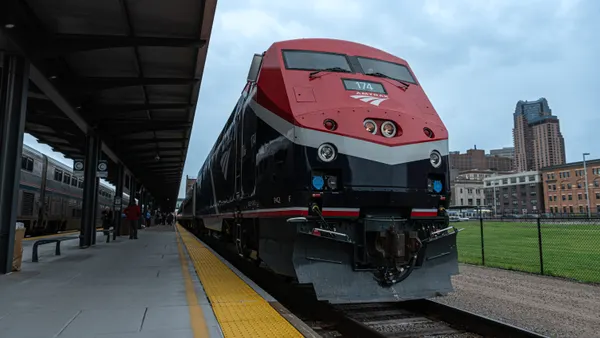Dive Brief:
- Delivery company UPS announced Monday it has led a consortium that deployed a "radical new charging technology" in London to help recharge its fleet of electric vehicles (EVs) without overwhelming the power grid.
- Its "intelligent" smart grid uses a central server to spread electricity around the building throughout the night to its charging stations and other areas of its logistics business. The company says the smart grid can be achieved through on-site energy storage and local power generation like solar panels. UPS hopes to soon have its entire fleet of 170 trucks in central London powered by electricity.
- This is believed to be the first deployment of the system anywhere in the world and is the result of a collaboration known as the Smart Electric Urban Logistics (SEUL) project between UPS, UK Power Networks and Cross River Partnership, with funding secured from the UK’s Office for Low Emission Vehicles.
Dive Insight:
UPS has been pushing toward an all-electric fleet for some time, having already bought 50 EVs earlier this year as part of its mission to rely less on the traditional combustion engine for its delivery trucks. The company hailed this latest initiative as another step toward making EV deployment a cheaper option than diesel equivalents.
If the technology works as intended, it could make a real difference for cities and urban delivery companies. "We are using new technology to work around some big obstacles to electric vehicle deployment, heralding a new generation of sustainable urban delivery services both here in London and in other major cities around the world," Peter Harris, director of sustainability at UPS Europe, said in a statement.
UPS has placed a big emphasis on adding more EVs to its fleet, which it first introduced in the 1930s and then reintroduced in 2001. The Atlanta Business Chronicle reported the company recently spent $25 million to pre-order 125 electric trucks from Tesla, which will be built next year. And last September, UPS announced it would be the first commercial customer in the United States for Daimler AG's new battery-powered FUSO eCanter, touted as the world’s first series-produced all-electric light-duty truck.
More EVs making deliveries on city streets will help reduce emissions and improve air quality, and with a big constraint on wider use being the impact on the electric grid, this could be a game-changer as companies look to use new technology for their fleets. Harris said the collaboration "marks a major turning point in the cost effective deployment of electric vehicles which in turn will play a key role in ensuring the global trend toward urbanization is sustainable."












